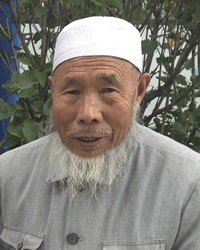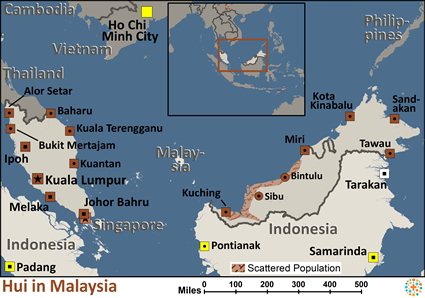The Hui trace their ancestry to Muslim traders, soldiers and officials who came to China during the seventh through the fourteenth centuries. Some of these Muslims stayed in China and married local Han Chinese women. Today they comprise the largest of China's Muslim nationalities and the third-largest minority group. Some of these Chinese Hui immigrated to the Southeast Asian nation of Malaysia.
There were two later major Hui immigrations, the first during the mid-seventeenth century and the second after the communist takeover of China in 1949. Many Hui may have moved to Malaysia with the hope of establishing overseas branches of Chinese businesses.
Today, the Chinese in Malaysia are the largest immigrant group. Many Chinese Buddhists have had difficulty fitting into Muslim Malay society. The Hui have been more easily accepted because the Malay and the Hui share the Muslim faith.
The primary language of the Hui in Malaysia is Mandarin Chinese. They will speak Bahasa Malay, the primary language of Malaysia, only when circumstances make it necessary. Many jobs in Malaysia are generated by the government. Applicants for these jobs must demonstrate competence in speaking the Malay language. At times the Chinese in Malaysia, including the Hui, have been subject to discrimination and persecution. Some Malaysians envy the Hui because of their prosperity.
At one time, most Hui in China were farmers and estate laborers. Nearly all Hui in Malaysia live in or around cities. The Hui in Malaysia work more in commerce, industry and the service sector. Many work in restaurants, markets, industry, mining, and trade.
The life of the Hui generally revolves around the mosque and its activities. Islam is a major part of their identity. Malay law defines a Malay as "a person belonging to any Malay race who habitually speaks the Malay language and professes the Muslim religion." Even the bonds of common religion cannot stretch beyond certain limitations. In the case of the Chinese Muslims, their difference of origin persists. These differences are reinforced through their position in the economic structure and by the formal institution of the Chinese Muslim Association. Chinese Muslims in Malaysia try to retain their ethnic and language differences.
The ethnic Chinese of Malaysia, including the Hui, maintain their schools and social, economic, and political organizations. As of 1995, there were sixty Chinese secondary schools in the country. These schools use Mandarin and English as the medium of instruction. They do not qualify for government grants and must support themselves financially through donations from the Chinese community.
In general, the Hui are energetic, self-confident and business-minded. They have certain customs which distinguish them from other Chinese populations in Malaysia. For example, they are forbidden from eating pork, a favorite meat of most Han Chinese people. Also, according to Muslim custom, Hui women are forbidden from marrying non-Hui men; yet Hui men may marry non-Hui women who are willing to convert to Islam. They trace family descent through the father's line and families also are structured according to the father's lineage. Wealthy Hui often send their children to universities outside of Malaysia where they can improve their English and business expertise.
Almost all Hui are Sunni Muslims. They are among the least radical Muslims in the world. Some Malay Muslims are disgusted with the Hui for their lack of zeal for Islam. For example, purdah (covering of the woman's entire body and head) has never existed among the Hui.
Sunni Muslims attempt to obey the teachings of the Koran and the prophet Mohammad. Allah, the supreme God of the universe, determines who enters paradise. Sunnis pray five times a day facing Mecca. They fast the month of Ramadan. They attend mosque services on Friday. If a Muslim has the means, he or she will make a pilgrimage to Mecca once in his or her lifetime. Muslims are also prohibited from drinking alcohol, eating pork, gambling, stealing, using deceit, slandering, and making idols.
The two main holidays for Sunni Muslims are Eid al Fitr, the breaking of the monthly fast, and Eid al Adha, the celebration of Abraham's willingness to sacrifice his son to Allah.
Constitutional guarantees of religious freedom are under attack in Malaysia. It is illegal to convert Muslims, but Muslims may proselytize whomever they choose. Therefore, the Hui are hesitant to make any spiritual changes which might be interpreted as conversion.
Muslims have militant mission organizations, or dawah, in Malaysia. They permit the exclusion of "undesirable Muslims, such as the Chinese ones." The Hui need to find their identity in Christ who will never reject them. Only Jesus can forgive their sins and grant them eternal life.
Pray that the Malaysian government will allow the gospel to be preached without restriction.
Pray that the gospel message in Mandarin will fill the airwaves of Malaysia via radio.
Pray that God will give the tiny group of Hui believers boldness to share the love of Jesus with their friends and families.
Pray for the distribution of Mandarin Bibles and other Christian materials among the Hui.
Pray that the Lord will raise up a Bible believing network of local churches among the Hui of Malaysia.
Scripture Prayers for the Hui in Malaysia.
| Profile Source: Joshua Project |

























